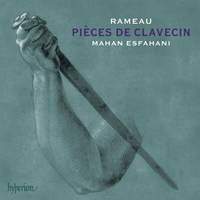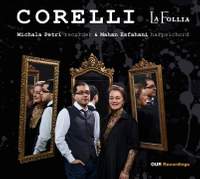Interview,
Mahan Esfahani on Rameau
 The Iranian harpsichordist Mahan Esfahani has been making waves among not only the specialised world of early music, but the mainstream classical press and audiences as well; a series of imaginative and critically acclaimed concert performances, allied to a growing discography of intelligently-programmed and flawlessly-executed albums, make him one of the fastest-rising keyboard stars of today.
The Iranian harpsichordist Mahan Esfahani has been making waves among not only the specialised world of early music, but the mainstream classical press and audiences as well; a series of imaginative and critically acclaimed concert performances, allied to a growing discography of intelligently-programmed and flawlessly-executed albums, make him one of the fastest-rising keyboard stars of today.
In the wake of his triumph at last month's Gramophone Awards (where he won the Baroque Instrumental category for his recording of CPE Bach's Württemberg Sonatas) I asked him a few questions about his latest release, a two-disc survey of Rameau's Pièces de clavecin - a fascinating, but somewhat under-performed, set of suites full of programmatic, and at times startlingly virtuosic, writing.
Up until now you've mostly recorded English and German repertoire. What drew you particularly to Rameau for this album, and did you find the French school required you to re-learn elements of your technique?
Any musician worth their salt, in my opinion, has to be able to play anything. Of course, there are a lot of fanciful ways offered in the historical performance community to side-step that obligation, and those ways are blissfully accepted. I really do believe that it's possible to generalise and still have a different playing style for each genre and period of music.
Of course, it takes a lot of work, and it takes a certain kind of work. In working with Rameau's music - which I have done on and off for maybe the last decade (which in my lifespan is a long time, relatively speaking) - I came to study French culture and declamation and visual art quite closesly, which is exactly what I'd do with studying any other repertoire, and which probably relates to my interests in studying languages and dialects. The rest is a matter of note-bashing, and I can't say that there was any conscious learning or un-learning, but perhaps some of the lessons I learnt from Rameau I carried over to Bach or Gibbons. Or perhaps the other way around as well.
You clearly have a very visual, pictorial view of these pieces, whether or not they carry a descriptive title. Do you find that imagining a “back-story” for each piece helps you in preparing them for performance, or is it just interesting and whimsical speculation?
Your question itself reveals that we've lost something in the way we discuss music! If we read the masterclass notes or discussion essays from before the Second World War from musicians in the circles of Liszt, Cortot, and other greats, we will notice that the technique of developing narratives was an important way of training musicians' imaginations. It helps strengthen the ties between a musician's brain and his fingers. It might be speculation, but that doesn't make it less of a valid way of making sense of this music. After all, Rameau didn't write his music for academic conferences.
In your notes you go into considerable detail about the Ruckers-Hemsch instrument you recorded this music on. Do you feel that individual instruments have a specific “voice” that suits them particularly to certain music, or indeed a “personality” that you as a performer have to work with)?
Certainly, the personality of a period instrument is a wonderful thing to behold. I would liken the experience of playing one to an enjoyable and edifying dinner with a great old artist. It's an unforgettable experience. I can recall minute details of period instruments that I've come into touch with, and frankly I can say I've forgotten a lot of the modern ones! Perhaps they need centuries to mature - who knows?
Despite making a great impression with recent live performances of JS Bach, so far you've steered largely clear of him on disc: are you deliberately giving an airing to the music of composers who have tended to languish in his shadow? And indeed, with your recent move to Deutsche Grammophon, might we now see your take on the 48 or the Goldberg Variations committed to disc...?
That hasn't been deliberate, really. Perhaps I feel too young to commit to much JS Bach on record, but of course every concert and recital of mine has something by him, if not completely devoted to his music. But your question has been asked much of me in the last few months. As for a '48' or otherwise with Deutsche Grammophon, I'm afraid I'm not at liberty to discuss some very exciting ideas in the pipeline!
You've recorded snatches of the modern harpsichord repertoire – Ligeti and Poulenc, for example. Do you see yourself exploring more of this side of things in the future, and what's your view of contemporary harpsichord composition? For you, does the instrument need bringing into modernity in this way?
I wouldn't say that Ligeti or Poulenc are particularly modern. The most important thing I can do as a harpsichordist is to engage with actual new music, which I am now doing with some interesting commissions in the works and with recent performances of new works. There is nothing more valuable (apart from Bach) for me.
I don't know if the instrument "needs it'' as much as people need to revisit their ideas of an instrument which for so long is such an easy target of derision by the musical mainstream. Perhaps it is really I who need it. The lessons taken from engagement with a living composer can be transferred to learning music by a dead one - who then, of course, becomes very much alive.
Mahan Esfahani's new disc of Rameau is out on Monday on Hyperion Records.
Available Formats: 2 CDs, MP3, FLAC, Hi-Res FLAC
Other recordings by Mahan Esfahani
Winner of the Baroque Instrumental category in the 2014 Gramophone Awards, this disc of keyboard works by CPE Bach offers an intriguing snapshot of a 'stage' in the evolution of the keyboard repertoire that is often overlooked.
Available Formats: CD, MP3, FLAC, Hi-Res FLAC
A partnership with recorder virtuosa Michala Petri enables these transcriptions of Corelli's violin sonatas to come to sparkling and creative life.
Available Formats: SACD, MP3, FLAC, Hi-Res FLAC





